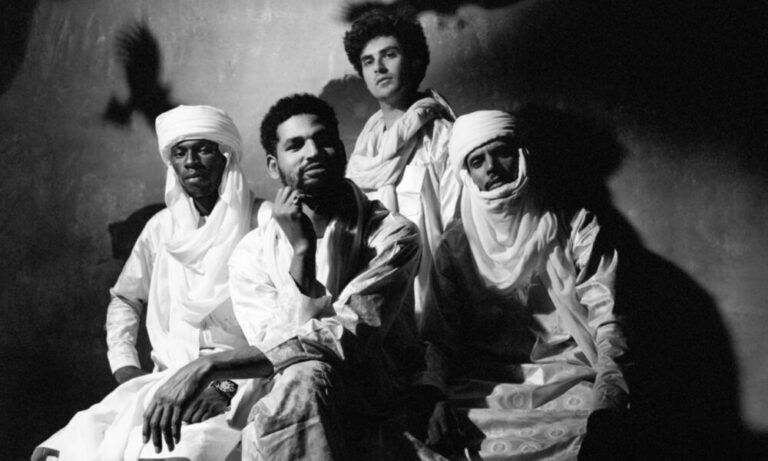The Tuareg guitar virtuoso Mdou Moctar announces a new version of “ Funeral for Justice ”, under the title of “ Tears for Injustice “.
Five months ago, Tuareg guitarist Mdou Moctar released the album Funeral for Justice, frenetic fusion of psychedelia, hard rock and West African desert blues that stunned critics around the world. The lyrics, spoken in Moctar's native language of Tamasheq, reflect the rage of a nation that has endured centuries of exploitation by French colonial powers and by corporations more interested in extracting gold and uranium and by improving the living conditions of the population. “ The strong try to hurt the weaksummarizes Moctar at WECB via a call from Niger, where he lives. We feel that this is not justice. »
In July 2023, days after Niger's President Mohamed Bazoum was ousted from power in a military coup, Moctar and his band went to a studio in Brooklyn, New York to re-record the album Funeral for Justice using acoustic instruments. The result is Tears of Injusticewhich will be released on February 28, 2025 on Matador Records.
The anger and frustration of the original songs are still present, but the lyrics have been brought to the forefront. “ On Funeral for Justice, we tried to give all our energy so that it was fast and everyone dancedexplains the guitarist. Here we want you to listen and understand everything I say. »
According to Mikey Coltun, the band's New York producer and bassist, the Brooklyn sessions provided a welcome distraction when Niger was in a state of extreme distress, and Moctar and his companions did not know when they would be able to return home. and see their families. “ It was a very tense sessionsays Coltun. Guys are very attracted to their phones. But we turned off the wifi and focused on the songs, even though they didn't yet know if they were going to be able to go home. »
Moctar, Coltun, drummer Souleymane Ibrahim and rhythm guitarist Ahmoudou Madassane worked live in the studio, without headphones. “ Many of these songs were recorded in one or two takesexplains Coltun. One of us would start playing a song in a different style, and everyone would join in. We pressed the record button and off we went. We wanted to make it seem like we were just spending time together in Niger, in a very casual way. »
Overdubs were kept to a bare minimum, but the band added backing vocals from Nigerian singers. “ These songs talk about what is happening to the Tuareg people and what is happening in Niger and West Africaexplains Coltun. It seemed abnormal to not include this group of people to have this emotion. When we put that into the album, it helped tie the whole thing together. »
Mdou Moctar emphasizes that the themes of the album are universal, even if they were inspired by the situation in his country of origin: “ Look at Ukraine. Look at Afghanistan, Senegal, Sudan, Palestine, Libya. All these countries have problems. Children, elderly people, women are killed. This all makes no sense to me. For me, justice does not exist. There are people behind all this misery who are happy because they will receive money for it. It's not fair. »
It's been almost ten years since Moctar began giving concerts all over the world, attracting sometimes skeptical crowds. “ Many people in the United States have never been exposed to West African cultureexplains Coltun. And we arrive on stage with turbans and boubous. On our tour with Tame Impala, people were laughing when we arrived. But at the end of the concert, everyone was asking for us. »
The guitarist used much of the money he earned to dig wells throughout Niger. In the future, he hopes to open a school for women. And whatever happens in his career, he says Niger will always remain his homeland. “ I share so much with my community. “I understand when they are in a good situation or not. I love them. I go to the West for work. I prefer to stay in Africa. »






